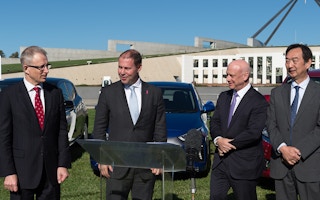A coalition of 17 Australian industry organisations has set up a new national body that aims to promote the adoption of electric vehicles (EVs) in Australia.
To continue reading, subscribe to Eco‑Business.
There's something for everyone. We offer a range of subscription plans.
- Access our stories and receive our Insights Weekly newsletter with the free EB Member plan.
- Unlock unlimited access to our content and archive with EB Circle.
- Publish your content with EB Premium.
Called the Electric Vehicle Council and launched at Parliament House in Canberra on May 22, the body aims to iron out the technical, economic, and infrastructure-related obstacles—such as a lack of charging infrastructure and low awareness levels—standing in the way of wide-scale EV uptake in the country.
Its workplan for the next three years includes drumming up demand for EVs by focusing on corporate fleets; pushing for policy incentives and vehicle emission standards to encourage EV adoption; and encouraging investment in areas such as a nationwide EV charging infrastructure.
It will also publish a state of electric vehicles report annually.
The Council, whose members represent organisations including non-profit think tank ClimateWorks Australia, EV giant Tesla and EV charging infrastructure firm JET Charge, was initially set up in 2016.
In the lead-up to its official launch, it has raised more than A$400,000 in cash and in-kind support for EV initiatives, briefed politicians, and presented at major industry conferences.
Beyhad Jafari, the Council’s chair, said in a statement that “while the global (EV) industry industry grows exponentially each year, Australia continues to miss out”. This is despite the environmental and economic benefits offered by the EV market, as well as the opportunity for innovation.
About A$50 billion has been invested in the global EV industry in the past decade, said Jafari, adding that the sale of EVs has continued to rise globally. But in Australia, just 0.1 per cent of the cars sold in 2014 were electric.
Earlier this year, news outlets also reported that EV sales in the country had “almost come to a halt”, with just 219 EVs sold last year—a 90 per cent drop from 2015. In comparison, 363,000 diesel vehicles and 768,000 petrol cars were sold last year.
Industry observers have given various reasons for Australia’s lagging progress on EV adoption compared to other countries, including the lack of government incentives to encourage people to buy EVs—which are currently significantly more expensive than conventional models.
The roll-out of EVs is also restricted by the lack of public charging infrastructure, and the scarcity of support services such as repairs and maintenance for the high-technology vehicles, say experts.
“Assessing the barriers preventing the mass uptake of electric vehicles in Australia requires a consistent and collaborative effort across a range of sectors,” noted Jafari.
The Electric Vehicle Council’s launch was accompanied by energy and environment minister Josh Frydenberg’s announcement of an A$390,000 grant from the Australian Renewable Energy Agency (ARENA), to support the uptake of EVs in Australia.
ClimateWorks Australia, which has long supported the greater adoption of EVs in Australia and produced research to create an environmental and economic case for doing so, welcomed the grant.
Scott Ferraro, head of implementation, ClimateWorks, noted that “this funding will enable us to work with the Electric Vehicle Council to provide more information about EVs to Australian consumers”.
He added that it also enable research on the right policy measures to encourage EV use, and address challenges such as the range of EV models available, and infrastructure.
“When powered by renewable energy, electric vehicles are zero emission vehicles,” said Ferraro.” This will help us meet our emission reduction targets faster and at lower cost, and can reduce impacts from air pollution in our cities.”
Business efforts
The private sector also announced its own measures to boost Australia’s EV ecosystem at the Electric Vehicle Council launch event. Energy giant AGL Energy for instance said the company would purchase 36 Mitsubishi EVs by mid-2018.
This would help the company achieve its target of having a tenth of its business car fleet being electric by 2018. AGL also unveiled an initiative that will let its employees lease the Mitsubishi Outlander EVs, and accompanying home-charging solutions.
These initiatives build on AGL’s move last year to launch an Electric Car Plan, which offers AGL customers the ability to charge their vehicles at home for just a dollar a day; so that they can be assured of the low costs of EV operation.
Andy Vesey, managing director and chief executive officer, AGL, said: “We are committed to leading the development of distributed energy technologies and are on our way to operating the largest fleet of plug-in vehicles of any Australian business.”
Encouraging other Australian government and corporate organisations to adopt EV fleet targets as well, Vesey added that the company also advocates for market and policy reform to overcome barriers to EV adoption in Australia.
“We recognise the commitment and coordination required across Australia’s emerging EV market to ensure this is achieved,” he said. “We look forward to working with the EV Council, the Federal Government and industry partners… to enhance that end goal.”










